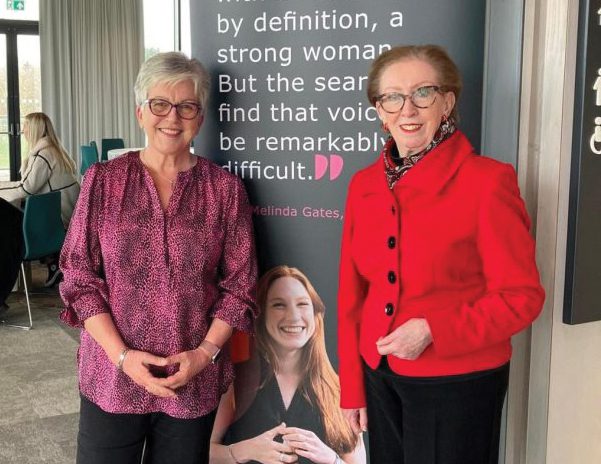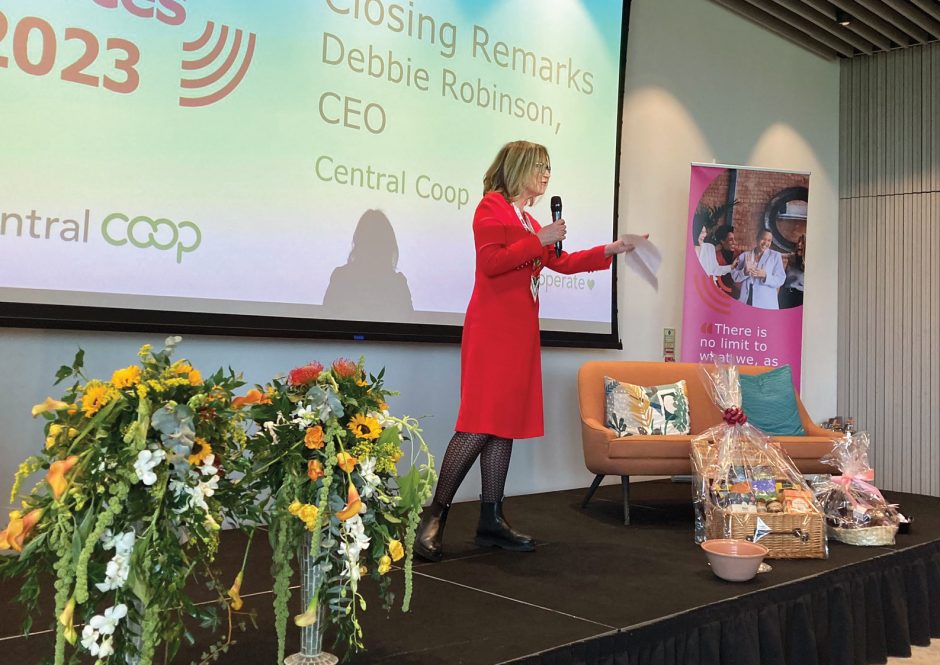Over 100 women got together at the National Memorial Arboretum in Staffordshire on 8 March to celebrate International Women’s Day.
Organised by Central Co-op, the event featured two keynote speeches, by Dame Margaret Beckett and Dame Pauline Green, along with four workshops and testimonies from two Ukrainian women who fled conflict to settle in the UK.
Central’s member relations officer and vice-president Tanya Noon welcomed participants while sharing her own co-op journey which started with her becoming a mother, carer, and getting her job at the local co-op all at once.
Through those years a lot of people – men as well as women – supported her. “It was a great platform for [getting] where I am today”, she said, explaining that as someone passionate about co-operatives she was happy to be on Central’s board.
“Nothing happens by chance,” she said, “it’s about the effort of all of us together.”
“Today is about inspiring women and women who inspire,” added Central’s vice president, Elaine Dean, who introduced the first keynote speaker of the day, Margaret Beckett.

Dame Margaret has been Labour MP for Derby South since 1983. In March 2022 she announced her decision to stand down from Parliament at the next general election, following a distinguished career that saw her become the first female foreign secretary in 2006. She also served as minister for housing and planning.
But, she told the event, she had never set out to be an MP, and lacked the theoretical background that many other politicians have.
“I don’t want anybody to think that I studied PPE at Oxford and did all those things that people tend to assume you did,” she added.
Born in Ashton-under-Lyne, Lancashire, to a carpenter father and teacher mother, she had two sisters. She was only young when she lost her father and the family fell into poverty.
“I felt there wasn’t a sufficient safety net for my family when I was about three,” she said, “He died when I was 12. So I joined the political party that was closest to my point of view on what I wanted, the Labour Party.”
After college she took a degree in metallurgy at the University of Manchester Institute of Science and Technology, and then joined the Transport and General Workers Union in 1964. Two years later she started working for the University of Manchester as an experiment officer in its metallurgy department, and in 1970 went to work for the Labour Party as a researcher in industrial policy.
This is why Labour introduced all-women shortlists, she said, adding that women now make up more than 50% of the Labour Party. Dame Margaret credits the increase to the party adopting a new electoral method as well as allocating more shadow positions to women.
As president of the Board of Trade – the first woman to hold the post – Dame Margaret played a key role in driving through the initial proposals for a National Minimum Wage, with legislation coming into force in 1998.
“Teamwork is what gives success,” she said, looking back on her other achievements in office including her work on the abolition of hereditary seats in the House of Lords and the fox hunting ban.
“Women most often break the glass ceiling, have different ideas, and are prepared to take different steps,” she said. “I didn’t have any kind of training or background to be in these posts. I just happened to be there and people encouraged me to get involved, to move forward.
“And I am sure people are encouraging you to speak up, to get a little bit more involved, to be prepared to step up and speak up for what you believe and all I would say is, ‘do!’.
“The fact that you are here today shows that you are interested and active, it show that you are people who have a lot to contribute, please contribute it for the sake of us all,” she said.
Pauline Green also described her journey, explaining that there were similarities with the other speakers’ stories.
“There’s a common theme, I think, that’s really where we came from, and where we got to without the least expectation that we would ever be there.”
Dame Pauline – like Dame Beckett – has not expected to end up a member of the European Parliament, or to take her later roles as secretary general of the Co-operative Union and president of the International Co-operative Alliance.
“I’ve also been very lucky,” she said, “and very honoured to have a career – two careers really, political and co-operative – that have allowed me to do things that I would never, ever have dreamt I would, to influence events, to effect legislation, to go to some amazing events in different parts of the world, and to take part in them and to meet some of the most inspirational people in the world.”
Her journey was “absolutely unexpected”, she added. “Here’s the rub, ladies. I wasn’t born to an entitled family. I didn’t go to an elite school. I didn’t spend my youth dreaming about being king of the world. I was not born to rule like some people.”
Dame Pauline was born in Malta to a Maltese mother and a British military officer.
“They were very ordinary,” she said, adding that her parents were “terrific” and “loved their family very much”.
Her father’s military career kept the family on the move, between Malta, Egypt and Germany. it made for an eventful childhood: they were in Egypt when the Suez Crisis broke out and had to be evacuated under army protection.
But although the constant upheaval disrupted her eduction, there were still some life-changing lessons: at school in Germany she was taught about the Rochdale Pioneers, which has stayed with her ever since.
“I can still remember,” she said, “I was so captivated by that story. I can still remember the lesson and the teacher’s face, who told us the story of the Pioneers saving children from bad health.”
When she was 14 her father returned to civilian life and the family moved to Kilburn in London. There, she studied for an Ordinary National Diploma in business studies and went on to work as a secretary, before joining the Metropolitan Police at the age of 21.
“That was very influential in forming my political views,” she said, recalling her arrest of a 10-year-old boy who had already committed 70 burglaries.
“What I took out of that was firstly, the importance of education because these children never went to school. And secondly, that you needed to change things and the way you change things is you find where the levers of power are, and you use them. And to me that meant politics.”
While taking time off work to raise her children, she took a degree at the Open University followed by a master’s in comparative government at the London School of Economics.
This was followed by a return to work, as a research assistant to the Co-operative Union. While there, she worked with the CWS on a policy that would later lead to the European Commission adopting new food hygiene rules.
After being elected to the European Parliament in 1993, she became the leader of the Socialist Group for five years. She was re-elected MEP but stood down to become head of the Co-operative Union – the first woman to have the job.
This was an exciting time, she said, recalling her work with the Cooperative Commission set up by Tony Blair to review the strategy and structures of the sector, with an aim to suggesting ways to develop and modernise the movement.
“We were setting up co-ops in new sectors of the economy.” she said. “That was a really exciting moment in time.”
She also represented the UK co-op movement internationally, particularly as president of the European region of the International Co-operative Alliance (ICA). In 2009 she took over as president of the ICA.
“That was a phenomenal moment, a seminal moment,” she said, “and a great way to end my career, because I didn’t start getting involved in a career until I was 41. So it was all back-loaded.
“We recreated the ICA from a representative forum to really a centre of excellence in terms of the knowledge and intelligence about the worldwide co-operative movement.”
The ICA’s main achievements during her term include the launch of a report on the size of the global co-operative movement – which became the World Co-operative Monitor. She says the knowledge acquired through this ICA research helped to secure representation for co-ops at the B20 meetings and persuading the UN to celebrate the International Year of Co-operatives in 2012.

“That year allowed us to build unity in the movement,” she said, pointing to the ICA’s launch of the global co-op marque, now used by co-ops around the world, including Central.
“How did my career happen? I have no idea actually – like Margaret, most of it wasn’t planned. I didn’t set out to do these things.
“Where does this girl come from? How did that career arise? I still don’t know. I retired when I was 68. I’m now 75 this year and I scratch my head and think ‘Did I really do those things?’ But it just goes to show people, no matter what their background, if they have the right support, if they get the right breaks, they can do anything,” she said.
Various workshops were hosted throughout the day, with sessions on Ukraine refugees, Central Co-op’s work in Malawi, and discussion of equity, self-care and menopause.
The event also featured a floristry demonstration by members of Central Co-op’s floristry team.

